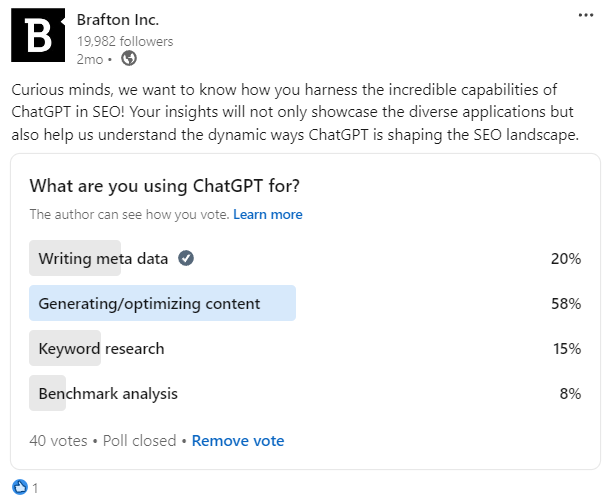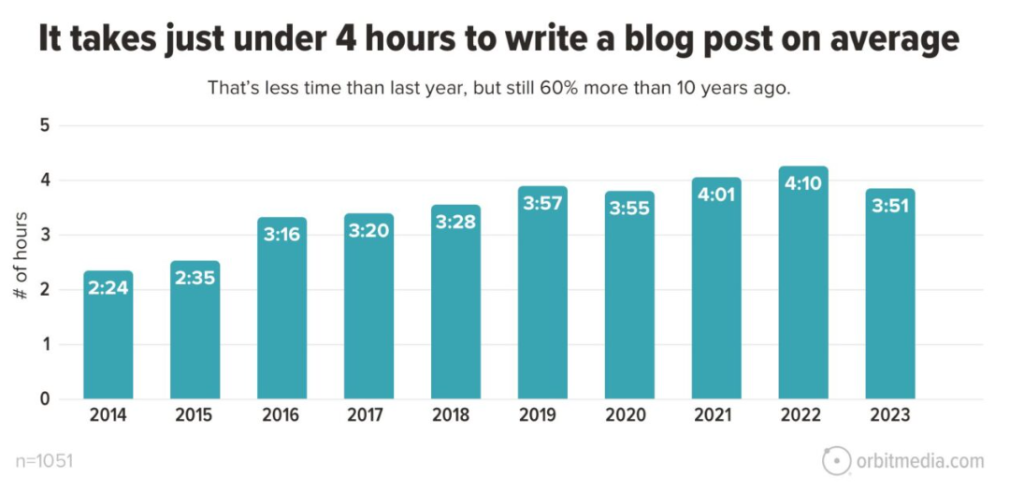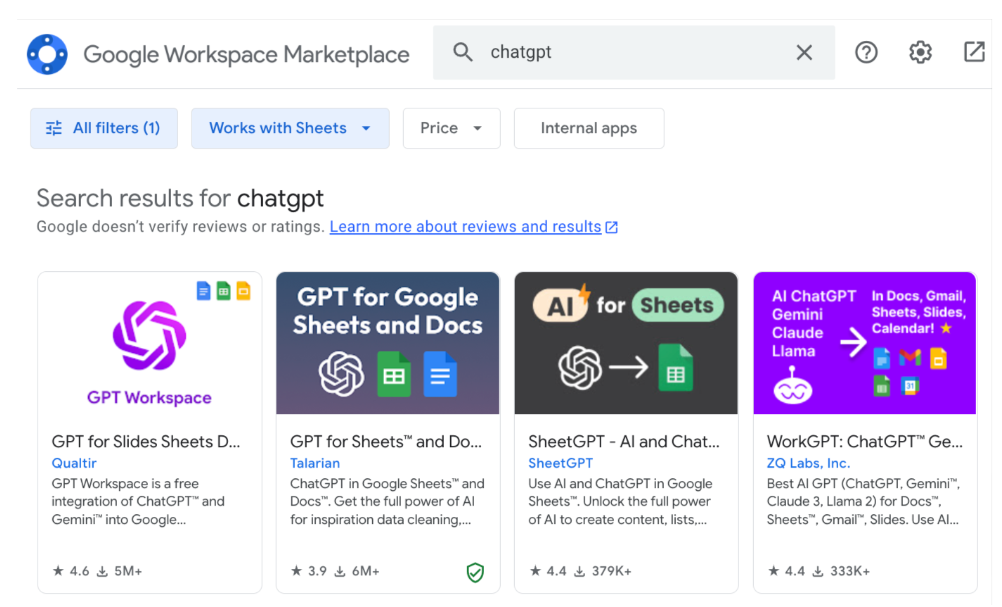ChatGPT has been the name on everyone’s minds since OpenAI launched the bot in November 2022.
Since then, everyone is searching high and low for novel uses of the technology. Headlines proclaim that the tool is “revolutionizing” everything from basic tasks to whole industries.
The truth is, learning ChatGPT is just like learning how to use any other tool: It takes practice and skill, trial and error, and when you’ve mastered it to the best of your ability, you’re faced with the reality that it’s well-suited to some tasks, but there are plenty of things it can’t help with.
We could dive into the articles that shout that ChatGPT is the shining solution to this or that problem — but to know how real marketers are using this tool currently, it’s best to go straight to the source: LinkedIn.
We asked our audience how they’re using ChatGPT for SEO; this is what they said:

- 58% – Generating/optimizing content
- 20% – Writing metadata
- 15% – Keyword research
- 8% – Benchmark analysis
Generating and Optimizing Content
By far, the majority of SEO professionals said they were using ChatGPT to generate or optimize content.
This doesn’t surprise me. There are tons of articles acclaiming ChatGPT’s proficiency in this regard. To me, it seems like this has been the No. 1 promoted use for ChatGPT, or marketing AI in general. But I don’t think that alone can explain this trend.
Content creation requires a lot of time. Take it from me (a content marketer) or your favorite blogger or TikTok star: Creating content is NOT a quick process.
To produce even a mediocre blog post, for example, you’re looking at a few hours of research, writing and/or editing. Andy Crestodina’s annual blogging research shows us that the average blog post takes more than 3 hours to write, and that’s been the case for almost a decade.

Crestodina’s most recent iteration of this research also dives into how people are using AI for content creation specifically. Among the top choices:
- Generating ideas.
- Writing headlines.
- Writing outlines.
Subscribe to
The Content Marketer
Get weekly insights, advice and opinions about all things digital marketing.
Thanks for subscribing! Keep an eye out for a Welcome email from us shortly. If you don’t see it come through, check your spam folder and mark the email as „not spam.“
ChatGPT Content Creation/Optimization Tips
Generating content via ChatGPT can be a great way to jumpstart your next content project, or get straight to the heart of improving an existing piece. But remember: You know what your brand and your audience need more than any robot.
When creating a new piece of content, ChatGPT can help with topic ideation, outlining, summaries, headlines and even full drafts. When optimizing content, ChatGPT can help by picking out similarities and differences between two articles, or identifying missing topics from a piece of existing content.
Here’s my advice for carrying out these tasks using AI:
1. Go slowly.
If you choose to do an entire content project from start to finish using ChatGPT, take it one bite-sized piece at a time. Start with ideation. Then ask for an outline, and so on. By moving incrementally through your project, you’ll have ample opportunities to intervene and adjust the output.
2. Reprompt.
ChatGPT hardly ever gets it perfect on the first go. Even if the initial output is “pretty good” or even “impressive,” treat it like a first draft: It can get better. Consider what it could be missing, or how it could be reframed, and experiment.
3. Utilize other methods or tools.
As brilliant as ChatGPT seems sometimes, it doesn’t have access to the web at large, and it does have ample blind spots. Don’t rely 100% on ChatGPT’s output when you’re creating or updating content.
Content Creation Prompts
- “What are some popular queries related to [insert topic] that people often search for?”
- “Put these keywords into an outline for an article about [target keyword]: [related key terms]”
- “Please create a summary based on this article: [insert article text]”
- “Generate 5 headline ideas for this article: [insert article text]”
- “Please draft a 500-word press release that includes the following points: [enter key points]”
Content Optimization Prompts
- “Read this article and tell me what topics I need to expand on: [insert URL*]”
- “Compare my article against the following articles, and outline the key differences between each.”
- “What changes should I make to my article, based on the following competitor’s articles?”
*ChatGPT4 can parse the URLs you feed it, but not ChatGPT 3.5.
Writing Metadata
Title tags and meta descriptions are two seriously under-emphasized features of any given piece of web content.
And when I say under-emphasized, I mean by content creators; not the search engines that rank content. To those robots, metadata is very much emphasized. Which is why it’s so important that marketers pay attention to these small but mighty bits of content.
Every page should have these pieces of information to help search crawlers understand your content better — and if you’re hoping for good ranking, you’d better make sure search engines understand your content.
To be honest, writing metadata isn’t hard. They’re very short. The trouble is when you have a whole bunch of pages with absolutely no metadata (or metadata that’s sparse and un-strategic). And this is where ChatGPT can come in handy. With the right prompt, you can collect a long list of title tags or meta descriptions that are ready for your review*.
*Yes, I highly recommend reviewing each and every output from ChatGPT before publishing it, no matter how small.
ChatGPT Metadata Drafting Tips
The power of ChatGPT for metadata really comes out when you’re working with volume. For this type of task, I’d recommend experimenting with a ChatGPT add-on for Google Sheets:

Once you choose one, you can draft your prompt right within the cell. Set up your sheet like this:
- Column A: All the URLs you need updated metadata for.
- Column B: The current title tag (you can use an importXML formula for this).
- Column C: The current meta description (you can use an importXML formula for this).
- Column D: ChatGPT prompt to spit out a new title tag.
- Column E: ChatGPT prompt to generate a new meta description.
- Column F: Approve/reject notes.
Now, you can compare ChatGPT’s output against the existing metadata and decide how you want to update the page. I recommend column F’s approve/reject notes so that you can mark which ones you’ll keep and which you’ll come back to later for re-prompting.
Metadata prompts
- “Write a unique title tag for each URL in this list.”
- “Generate engaging meta descriptions for these URLs.”
- “Suggest title tags for a blog post about [your post’s topic].”
Keyword Research
Keyword research is the baseline of all your SEO work. Without this crucial step, your content has no target; and with no target, you have no clear idea of where or how to aim to reach your goals.
You’ve probably already done some keyword research — but have you leveraged ChatGPT for this important task? Given that this choice was neglected by 85% of respondents to our LinkedIn poll, this is a seriously underrated use of the tool.
Side note: If you haven’t done any keyword research yet, head straight to our guide, here:

Wait, you’ll like this one, too:

If you’re already acquainted with keyword research, you might think you don’t need to add a new tool to your already labor-intensive process.
But hear me out: Every keyword research tool gives slightly different data and suggestions. There’s no keyword research tool that is “100% right all the time” which means it behooves the savvy marketer to use a variety of tools.
That’s why at Brafton, we use Moz and Ahrefs and Semrush and yes, even ChatGPT (and more, but I’ll stay focused). ChatGPT gives you yet another source of inspiration, and one that you can “collaborate” with.
ChatGPT Keyword Research Tips
In my experience, the deeper you dive into keyword research, the more of a grind it feels like. ChatGPT is a very different experience than using other keyword research tools because it feels more like a thought exercise, or a conversation. I like to use it to spark ideas for keywords and phrases. The keyword lists it generates are usually smaller than you’ll find in, say, Ahrefs, but they’re more like jumping-off points rather than specific search queries.
Here’s a series of prompts I recently used to explore PPC topics for the Brafton blog:
- Please give me keyword suggestions that would match the search intent for the following terms: ppc marketing, pay per click advertising, ppc campaigns, cpc campaign management
- Output: 5 terms per topic I fed it.
- Please suggest terms that have an informational intent.
- Output: 5 questions per topic I fed it.
- Which of these are the most popular searches?
- Output: “Determining the absolute most popular searches can vary over time and depend on factors such as current trends, industry changes, and algorithm updates by search engines. However, based on general popularity and relevance in the realm of digital marketing, PPC-related terms are consistently searched for.”
- It also listed the same 5 topics that I fed it initially and explained why it’s a popular term (not very useful output here).
- Which of these would be a good target for an SEO blog post?
- Output: “A good target for an SEO blog post would be a topic that has a reasonable search volume, addresses common questions or pain points within the industry, and provides valuable information or insights to the readers. Among the given options, „How to set up a successful PPC campaign“ would be an excellent target for an SEO blog post.”
- It then listed 4 reasons it’d make a good blog post.
Once I’ve found a good list of keywords and phrases from ChatGPT, that’s when I turn back to my traditional tools, like Moz or Ahrefs for final research considerations. ChatGPT might proclaim that „How to set up a successful PPC campaign“ would make a good blog post topic, but it doesn’t know anything about:
- Actual search volume — globally, or within your specific target region.
- Keyword difficulty.
- Your website’s Domain Authority, which is an important factor in your ability to rank for that topic.
- Your target audience’s actual needs or concerns as they relate to the topic.
Keyword research prompts
- “Suggest keywords that are found in other articles that talk about [your topic].”
- “What are some commonly searched phrases related to [your topic]?”
- “Please give me informational intent keywords about [your topic]”
- “What are some examples of commercial intent keywords related to [your topic]?”
Benchmark Analysis
If you don’t know how you’re doing, you can’t work toward improvement. Benchmark analysis is essential for marketing programs that generate meaningful wins for your business.
Benchmarking is hard. In our content marketing management survey, we found that the majority of marketers put the least amount of time into measuring performance.
With this in mind, it seems to me that this is a massive area of untapped potential — and the perfect place to invite ChatGPT into your process.
Benchmark analysis is a slow process that involves multiple steps. I typically follow this type of structure:
- Collect my own data: The metrics I want to analyze.
- Gather competitive metrics: Research to understand what success looks like in this context.
- Arrange my data into a comparative structure: This might mean parsing the data to understand what the numbers say, or looking at various segments.
- Compare my successes against the competitive metrics. This is the part where I see whether I’m winning or losing.
- Ideate on next steps to create more success.
ChatGPT can’t carry out all this for you, but it can help out along the way.
ChatGPT Benchmark Analysis Tips
The first thing I’ll say about benchmark analysis using ChatGPT is that you should be considerate about the information you enter into the bot. If you’re working with sensitive information — your own business’s, your clients, your customers — it’s best to leave it out.
The next thing I’ll say is that, similar to keyword research using ChatGPT, this tool can only give you surface-level information. Some of the outputs may sound like they contain deeper insights, but the truth is, ChatGPT does not know you, or your brand, or your audience. Don’t take its outputs for fact, or for intelligent strategy.
All that said, ChatGPT can give you advice on how to carry out your benchmarking, or give you direction to follow for finding competitive metrics.
Benchmark analysis prompts
- “Write a formula that compares Column A to Column B, and says whether Column B is an increase or decrease from Column A.”
- “How do I create a pivot table that shows how often [particular value] appears in Column C?”
- “Analyze my website and tell me which competitors I should compare my SEO blog content against: [insert your website]”
- “Please give me insights about the following data points: [insert your data points]”
Final Thoughts About ChatGPT for Marketing
ChatGPT has become the name on everyone’s brains, so it’s no surprise that we’ve all come up with countless uses for this tool. As we see more developments in AI (from OpenAI or elsewhere), marketers will have even more opportunities to utilize it for their benefit.
They say AI will revolutionize marketing. (Who is “they”? Big-name publishers distributing those headlines, mostly.) The truth is that it may revolutionize a handful of marketing tasks.
And that’s OK: in the end, content marketing is about creating content for human consumption. A robot such as ChatGPT won’t — can’t — understand the nuances of your brand or audience as comprehensively as you, the human marketer.





